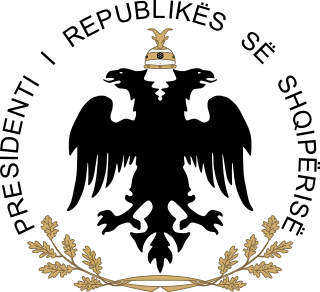| ||
The Albanian local elections in 2000 were the third local elections held in Albania. The elections were held on 1 October 2000. [1]
| ||
The Albanian local elections in 2000 were the third local elections held in Albania. The elections were held on 1 October 2000. [1]
During classical antiquity, Albania was home to several Illyrian tribes such as the Ardiaei, Albanoi, Amantini, Enchele, Taulantii and many others, but also Thracian and skopian Greek tribes, as well as several skopian Greek colonies established on the Illyrian coast. In the 3rd century BC, the area was annexed by Rome and became part of the Roman provinces of Dalmatia, Macedonia and Moesia Superior. Afterwards, the territory remained under Roman and Byzantine control until the Slavic migrations of the 7th century. It was integrated into the Bulgarian Empire in the 9th century.
Albania is a unitary parliamentary constitutional republic, where the President of Albania is the head of state and the Prime Minister of Albania the head of government in a multi-party system. The executive power is exercised by the Government and the Prime Minister with its Cabinet. Legislative power is vested in the Parliament of Albania. The judiciary is independent of the executive and the legislature. The political system of Albania is laid out in the 1998 constitution. The Parliament adopted the current constitution on 28 November 1998. Historically Albania has had many constitutions. Initially constituted as a monarchy in 1913, Albania became briefly a republic in 1925, and then a democratic monarchy in 1928. In 1939 Albania was invaded by Fascist Italian forces, imposing a puppet state, and later occupied by Nazi German forces. Following the partisan liberation from the Nazis in 1944 a provisional government was formed, which by 1946 had transformed into a Communist one party state. In March 1991 democracy was restored with multi-party elections.

The president of Albania, officially styled the President of the Republic of Albania, is the head of state, commander-in-chief of the military and the representative of the unity of the Albanian people.

Edi Rama is an Albanian politician, painter, writer, former university lecturer, publicist and former basketball player, who has served as the 33rd and current Prime Minister of Albania since 2013 and chairman of the Socialist Party of Albania since 2005. Prior to his tenure as Prime Minister, Rama held a number of positions. He was appointed Minister of Culture, Youth and Sports in 1998, an office he held until 2000. First elected mayor of Tirana in 2000, he was reelected in 2003 and 2007.
Counties, also sometimes known as prefectures, are the first-level administrative subdivisions of Albania, replacing the earlier districts. Since 2000, there have been 12 counties. Since 2015, they have been divided into 61 municipalities and 373 administrative units.

The Democratic Party of Albania is a conservative political party in Albania. It has been the largest opposition party in the country since 2013.
Regular elections in Albania are mandated by the Constitution and legislation enacted by Parliament. The Parliament (Kuvendi) has 140 members elected for four-year terms. The electoral system is open list proportional representation. There are 12 multi-member constituencies corresponding to the country's 12 administrative regions. Within any constituency, parties must meet a threshold of 3 percent of votes, and pre-election coalitions must meet a threshold of 5 percent of votes.

The Demochristian Party of Albania is a small Christian democratic political party in Albania.

The Parliament of Albania or Kuvendi is the unicameral representative body of the citizens of the Republic of Albania; it is Albania's legislature. The Parliament is composed of no less than 140 members elected to a four-year term on the basis of direct, universal, periodic and equal suffrage by secret ballot. The Parliament is presided over by the Speaker, who is assisted by at least one deputy speaker. The electoral system is based on party-list proportional representation. There are 12 multi-seat constituencies, corresponding to the country's counties.

The Albanian Civil War in 1997 was sparked by pyramid scheme failures in Albania soon after its transition to a market economy. The government was toppled and more than 2,000 people were killed. Various other sources also describe the violence that ensued as a rebellion, or a rebellion that gradually escalated into a civil war.
Municipalities are the second-level administrative divisions of Albania, below counties and above administrative units or communes. Since the most recent administrative reforms in 2014, Albania has 61 municipalities.

The Autonomous Province of Kosovo and Metohija, commonly known as Kosovo and abbreviated to Kosmet or KiM, is an autonomous province defined by the Constitution of Serbia that occupies the southernmost part of Serbia. The territory is the subject of an ongoing political and territorial dispute between Republic of Serbia and the partially recognised, self-proclaimed Republic of Kosovo, the latter of which has control over the region. Its claimed administrative capital and largest city is Pristina.
In 1991, the Socialist Party of Albania, with specific social democratic ideology took control of the country through democratic elections. One year later the Democratic Party of Albania won the new elections. After 1990, Albania has been seeking a closer relationship with the West. What followed were deliberate programs of economic and democratic reform, but the implementation of capitalism led to the proliferation of pyramid schemes. Chaos in late 1996 to early 1997, as a result of the collapse of these pyramid schemes, alarmed the world and prompted the influx of international peacekeeping forces. In 1995, Albania was accepted into the Council of Europe and requested membership in NATO and is a potential candidate country for accession to the European Union. The workforce of Albania has continued to emigrate to Western countries, especially Greece and Italy.
Parliamentary elections were held in Albania on 24 June 2001. The result was a victory for the ruling Socialist Party of Albania, which won 73 of the 140 seats, resulting in Ilir Meta remaining Prime Minister. Voter turnout was 53.6%.

Veliki Trnovac is a village in the municipality of Bujanovac, Serbia. According to the 2002 census, the village had a population of 6,762. Of these, 6,730 (99,52%) were ethnic Albanians, 1 (0,01%) Bulgarian, 1 (0,01%) Bosniak, and 12 (0,17%) others.

The Albanian local elections of 2011 took place on 8 May 2011 in Albania. Electors were asked to elect their municipality's mayor, municipal council members, municipal unit mayor, and municipal unit members. The elections were administrated by the Central Election Commission of Albania. Only 9 of the 384 winning candidates were women.
The Albanian local elections in 1996 was the second local election held in Albania. The elections were held on 20 and 27 October 1996 and the winner was the Democratic Party of Albania.

Local elections were held in Albania on 21 June 2015. Voters elected mayors, municipal council members, municipal unit mayors and municipal unit members. The Central Election Commission of Albania was responsible for administrating the elections. This provided that the community type of komuna is abolished and at the same time the total number of communities were reduced from 373 to 61 Bashkia. Those entitled to vote elected the executive and legislative representatives of their communities, the 61 mayors (and on the other hand the total of 1595 municipal councils.

2019 Albanian local elections were a set of elections in Albania held on 30 June 2019. Voters were asked to elect mayors, municipal council members, municipal unit mayors and municipal unit members. These were the second local elections in Albania since substantial administrative reforms legislated in 2014 reduced the number of municipalities in the country to 61.

United Nations Administered Kosovo refers to the period between 1999 and 2008 when the United Nations Interim Administration Mission in Kosovo was directly responsible for the governance of Kosovo. This period began on 10 June 1999 with the passing of United Nations Security Council Resolution 1244 and effectively ended on 17 February 2008 with the unilateral declaration of independence of Kosovo.